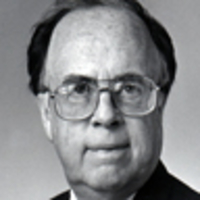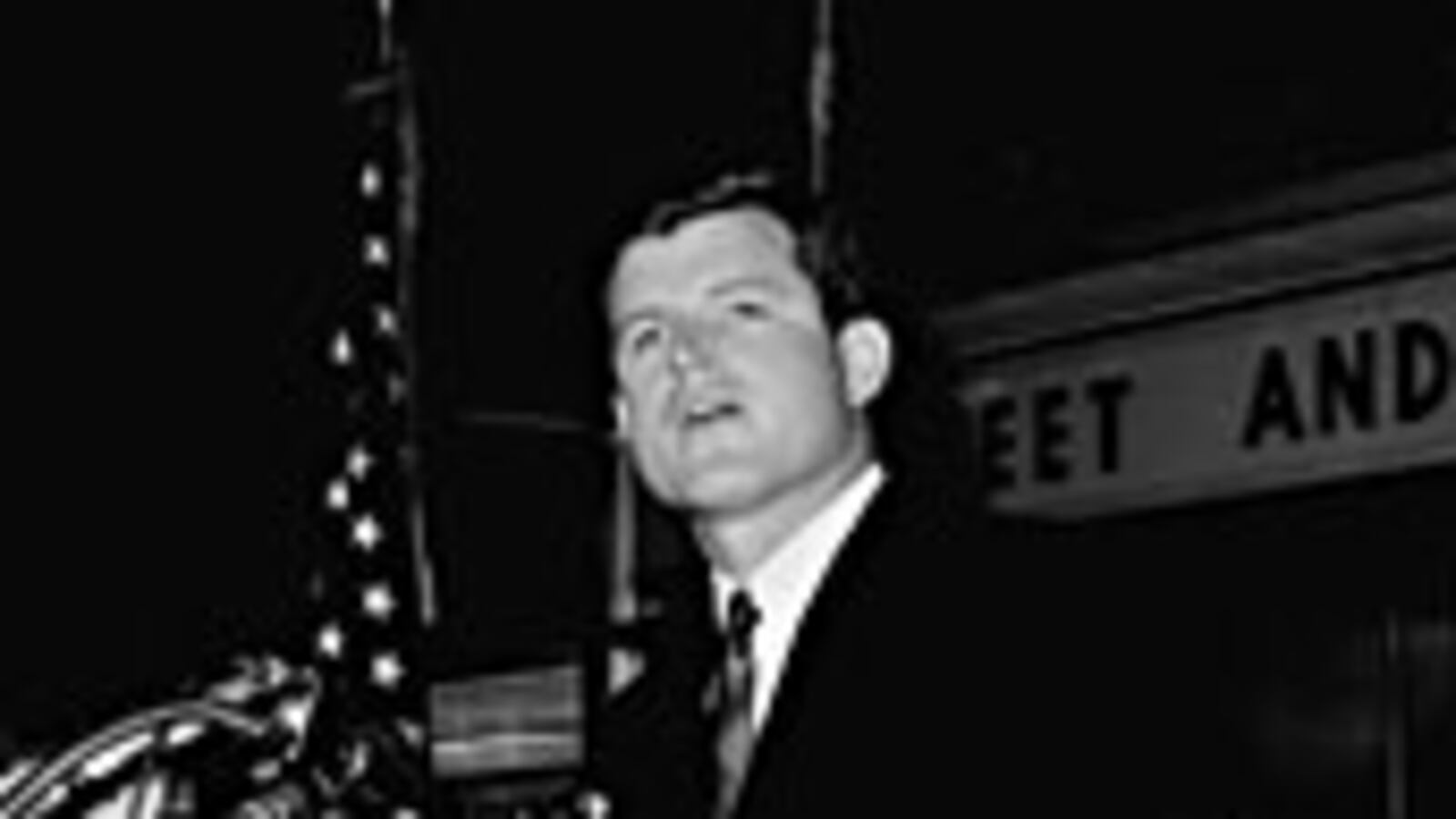
The tributes are pouring in, from presidents, statesmen, senators, and journalists.
In a few days, there will be formal eulogies at his funeral. Those speakers will have a special task—not just of capturing the greatness of Edward M. Kennedy, but of matching or even approaching the standard he set in dozens of eulogies he delivered over four decades honoring family, senators, friends, and staff.
The best-known eulogies are for his family, his mother Rose Fitzgerald Kennedy (“She sustained us in the saddest times—by her faith in God, which was the greatest gift she gave us”), Jacqueline Kennedy and her son, John F. Kennedy, Jr., and, most of all, his brother Robert.
At St. Patrick’s Cathedral in 1968, he quoted a speech Robert had given in South Africa about moral courage:
For the fortunate among us, there is the temptation to follow the easy and familiar paths of personal ambition and financial success so grandly spread before those who enjoy the privilege of education. But that is not the road history has marked out for us. Like it or not, we live in times of danger and uncertainty.
And then he concluded in a passage often shown on television:
My brother need not be idealized, or enlarged in death beyond what he was in life, to be remembered simply as a good and decent man, who saw wrong and tried to right it, saw suffering and tried to heal it, saw war and tried to stop it. Those of us who loved him and who take him to his rest today, pray that what he was to us and what he wished for others will some day come to pass for all the world. As he said many times, in many parts of this nation, to those he touched and who sought to touch him:
Some men see things as they are and say why. I dream things that never were and say why not.
Of his nephew, John, who died in a plane crash in 1999, Ted said in 1999:
We dared to think, in that other Irish phrase, that this John Kennedy would live to comb gray hair, with his beloved Carolyn by his side. But like his father, he had every gift but length of years. We who have loved him from the day he was born, and watched the remarkable man he became, now bid him farewell.
And of Jacqueline Kennedy, he said in 1994:
During those four endless days in 1963, she held us together as a family and a country. In large part because of her, we could grieve and then go on. She lifted us up, and in the doubt and darkness, she gave her fellow citizens back their pride as Americans.… She made a rare and noble contribution to the American spirit. But for us, most of all she was a magnificent wife, a mother, a grandmother, a sister, aunt, and friend. She graced our history.
Most of his eulogies honored other politicians, many of them fellow senators. In 1983 he spoke of Henry M. “Scoop” Jackson of Washington:
His legacy lives in the lesson he taught us that national defense means not only a strong military, but a just society. He was an advocate of modern weaponry and greater security. But he never believed that he could or should pay for a missile or a bomber by taking food from a hungry child or hope from a jobless worker. He was a champion of labor even when unions were said to be out of style; he was a tribune of civil liberty even at the McCarthy era. Some said he lacked charisma; in reality, he had a charisma of conscience.
Rep. Joe Moakley of Massachusetts, a longtime colleague, died in 2001 and Kennedy praised his service to the nation, the state, and the people of his district: “It’s no wonder God chose to call him home on Memorial Day—the national day of honor for those who served the nation so well.”
The very last eulogy he gave, in January of this year, spoke of Claiborne Pell of Rhode Island:
As a United States senator, Claiborne Pell never hesitated to give credit to others to help achieve the causes he held dear. I smile when I think of the many times I heard him say, “I always try to let the other fellow have my way.” It was Claiborne Pell who opened the doors of opportunity and progress for millions of young Americans, who have been able to go to college because of a Pell Grant. … Claiborne was a senator of high character, great decency, and fundamental honesty. And that’s why he became the longest-serving senator in the history of Rhode Island.
He spoke of many people with no direct involvement in government. When Coretta Scott King died in 2006, Kennedy said:
It was an extraordinary privilege for me to have the chance to know her. She showed me, as she showed us all, what it means to overcome—not only, as the spiritual says, "some day"—but every day. … There were countless times along the way when it seemed the nation might never relinquish the old traditions of prejudice, bigotry, and discrimination. We who lived through those years recall Coretta as a remarkable combination of power and peacefulness. In the face of her constant courage, her unshakable faith, her inner strength, and quiet grace, even Jim Crow had to yield.
Of Arthur Schlesinger, who had written and worked for John and Robert Kennedy, Ted Kennedy said in 2007:
He always seemed to be at the very pinnacle of modern historians, and for 60 years he was. He’s written about the age of Jackson and the age of Roosevelt, but in many ways, for the past six decades, we’ve been living in the Age of Schlesinger, because that’s how all of us who knew Arthur and loved him so much felt about those years. … He believed very deeply that a knowledge of history was essential to temper and civilize the use of power. He loved to quote the words of Winston Churchill—“The longer you look back, the further you can look forward.” … Arthur was a beloved friend for decades who wrote history with unsurpassed eloquence, and shaped history with unsurpassed wisdom and scholarship.
Dave Nyhan, a Boston Globe reporter and editor, covered Ted a lot. After his death in 2005, Ted said:
As one of his fellow newsies put it, “He didn’t just cover a story, he surrounded it. H knew it inside out.” You saw him everywhere. A Nyhan article or column over breakfast was the perfect way to start the day—except when he covered me. And then I would hold my breath and hope I didn’t lose my breakfast. …
He believed public service was an honorable profession, and he held us to the highest standards, which was what he asked of himself. If we strayed, he let us know. But he didn’t believe in piling on.
Some of his fondest farewells were to the veterans of John’s 1960 campaign. Of Pierre Salinger in 2004, he recalled his piano-playing, his humor, and his cigars. “We couldn’t have had the New Frontier without Pierre—and with Pierre it was a lot more fun.”
And of his brother-in-law, Steve Smith, he said in 1990:
From the day he married Jean, Steve was the shoulder we all leaned on in any of our endeavors. He could go toe-to-toe with Dad on any business deal, and head-to-head with any politician in the country on any political campaign. For over 30 years, he gave his heart, his soul, his love, his talent and his life to our family. As I said the other day, there would not have been a Camelot without Steve Smith.
But some of the most heart-felt eulogies were for members of his staff. For many years his staff has been the ablest on Capitol Hill, but most of the public never knew their names.
Of Eddy Martin, his chief of staff for many years, Kennedy told of how he relied on him for 45 years from 1961, when he began to staff his first campaign for the Senate, until not long before Martin’s death in 2006, when Ted was elected for the eighth time (with a landslide 67 percent of the vote). He said:
Even at our most recent dinners and times together, Eddy’s sense of what was happening in the Commonwealth and in the country was keener and more perceptive than anyone else I knew. Eddy didn’t need a poll to tell him what was right. He just knew it in his gut. In this last campaign, I still relied on Eddy’s judgment and advice. “Should I debate my opponent?’
“Absolutely,” Eddy said. “Just make it 30 minutes and air it during the baseball playoffs.”
Of Mary Murtaugh, he told of the time in 1979 when she said she should take full responsibility for national and Massachusetts fishing issues.
The fishermen needed a woman, she said, to help get their act together in Congress. I told her I’d been handling that one myself for 12 years and hadn’t been doing all that badly. “You can’t be serious about that,” she said. “The Russians are practically landing with their trawlers on Cape Cod, and New Bedford is ready to lynch you.” That was in 1975, and by 1977, after we turned her loose, the Russians were put 200 miles out to sea by Mary Murtaugh’s Act of Congress.
In 1994 Jerry Tinker, his chief aide on immigration and refugee affairs for two years, died, and Kennedy recalled visits to refugee camps in India, Bangladesh, and Ethiopia as well as his legislative work:
Because of Jerry, millions of citizens from other countries have had the chance to seek a new life and pursue the golden dream and opportunity of America.
America is a nation of immigrants. Because of Jerry, that priceless aspect of our history and heritage, our immigrant heritage, has been renewed and revitalized for our own day and generation. His achievements are found not only on the pages of the statute books, but in the life of the nation as well.
Through his able work and tireless dedication on behalf of refugees in every corner of the world, Jerry may well have been responsible for saving more lives than any other person of our time.
Adam Clymer is a former chief Washington correspondent of The New York Times and author of Edward M. Kennedy: A Biography.






